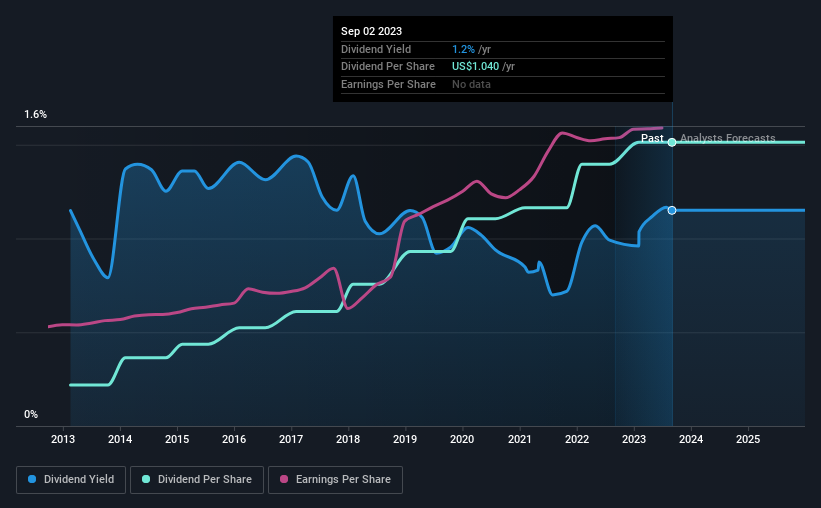Exponent, Inc. (NASDAQ:EXPO) Goes Ex-Dividend Soon
Regular readers will know that we love our dividends at Simply Wall St, which is why it's exciting to see Exponent, Inc. (NASDAQ:EXPO) is about to trade ex-dividend in the next four days. Typically, the ex-dividend date is one business day before the record date which is the date on which a company determines the shareholders eligible to receive a dividend. The ex-dividend date is of consequence because whenever a stock is bought or sold, the trade takes at least two business day to settle. Thus, you can purchase Exponent's shares before the 7th of September in order to receive the dividend, which the company will pay on the 22nd of September.
The company's next dividend payment will be US$0.26 per share. Last year, in total, the company distributed US$1.04 to shareholders. Last year's total dividend payments show that Exponent has a trailing yield of 1.2% on the current share price of $90.43. Dividends are a major contributor to investment returns for long term holders, but only if the dividend continues to be paid. We need to see whether the dividend is covered by earnings and if it's growing.
Check out our latest analysis for Exponent
Dividends are typically paid from company earnings. If a company pays more in dividends than it earned in profit, then the dividend could be unsustainable. Exponent paid out 50% of its earnings to investors last year, a normal payout level for most businesses. That said, even highly profitable companies sometimes might not generate enough cash to pay the dividend, which is why we should always check if the dividend is covered by cash flow. Dividends consumed 60% of the company's free cash flow last year, which is within a normal range for most dividend-paying organisations.
It's positive to see that Exponent's dividend is covered by both profits and cash flow, since this is generally a sign that the dividend is sustainable, and a lower payout ratio usually suggests a greater margin of safety before the dividend gets cut.
Click here to see the company's payout ratio, plus analyst estimates of its future dividends.
Have Earnings And Dividends Been Growing?
Stocks in companies that generate sustainable earnings growth often make the best dividend prospects, as it is easier to lift the dividend when earnings are rising. If earnings fall far enough, the company could be forced to cut its dividend. It's encouraging to see Exponent has grown its earnings rapidly, up 21% a year for the past five years. Management appears to be striking a nice balance between reinvesting for growth and paying dividends to shareholders. Earnings per share have been growing quickly and in combination with some reinvestment and a middling payout ratio, the stock may have decent dividend prospects going forwards.
The main way most investors will assess a company's dividend prospects is by checking the historical rate of dividend growth. Since the start of our data, 10 years ago, Exponent has lifted its dividend by approximately 21% a year on average. It's great to see earnings per share growing rapidly over several years, and dividends per share growing right along with it.
The Bottom Line
Is Exponent an attractive dividend stock, or better left on the shelf? It's good to see earnings are growing, since all of the best dividend stocks grow their earnings meaningfully over the long run. However, we'd also note that Exponent is paying out more than half of its earnings and cash flow as profits, which could limit the dividend growth if earnings growth slows. All things considered, we are not particularly enthused about Exponent from a dividend perspective.
Curious what other investors think of Exponent? See what analysts are forecasting, with this visualisation of its historical and future estimated earnings and cash flow.
Generally, we wouldn't recommend just buying the first dividend stock you see. Here's a curated list of interesting stocks that are strong dividend payers.
Have feedback on this article? Concerned about the content? Get in touch with us directly. Alternatively, email editorial-team (at) simplywallst.com.
This article by Simply Wall St is general in nature. We provide commentary based on historical data and analyst forecasts only using an unbiased methodology and our articles are not intended to be financial advice. It does not constitute a recommendation to buy or sell any stock, and does not take account of your objectives, or your financial situation. We aim to bring you long-term focused analysis driven by fundamental data. Note that our analysis may not factor in the latest price-sensitive company announcements or qualitative material. Simply Wall St has no position in any stocks mentioned.

